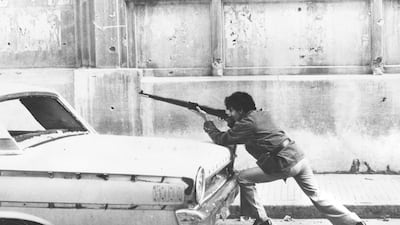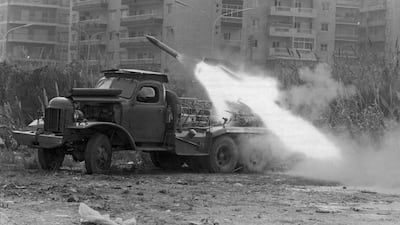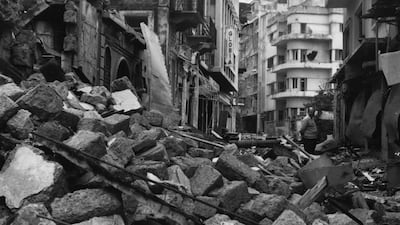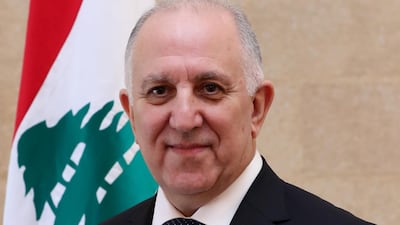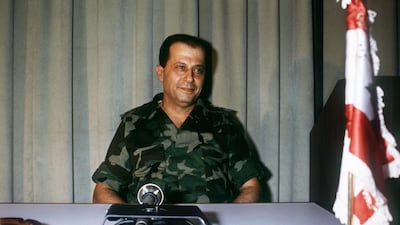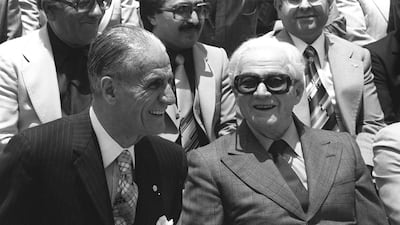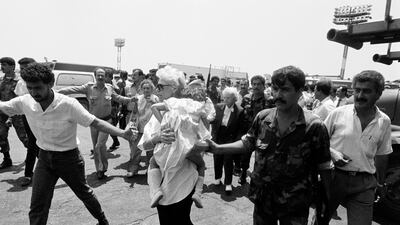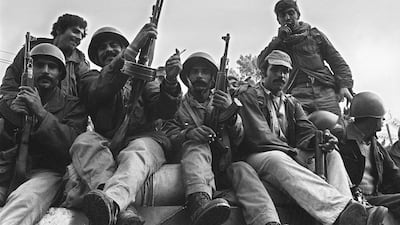A key figure in the crackdown on Lebanon’s protest movement said he killed two people during the civil war, in rare admission of direct violence during Lebanon’s bloodiest conflict.
Mohammed Fahmi told Hezbollah’s Al Manar television on Saturday that he was a junior Lebanese army officer when he killed the two in 1981.
“I apologise to the folks, to the audience. There was an incident and I killed two,” the staunchly pro-Hezbollah minister said.
Mr Fahmi, a Sunni, did not reveal whether the killings were part of an army operation or whether he carried them out on his own, amid the fragmentation of the military during that period.
He said the two belonged to a “powerful group”, and that an incident occurred, without giving any further details.
But Mr Fahmi said President Michel Aoun, a senior officer at the time, protected him and that a “sentimental” relationship had since developed between them.
“It happens that I am loyal. As long as I have a breath in me neither I nor my family will forget what he did,” he said.
“He protected me from getting killed.”
The civil war, which by its later stages had descended into a war of all-against-all, ended in 1990, a year after the Saudi and US-backed Taif Agreement awarded Damascus sway over Lebanon.
Mr Fahmi became head of Lebanese army intelligence, part of the enforcement tools for the Syrian regime in the country, which included Hezbollah.
He held the position from the late 1990s until he left the military in 2006, joining Blom, Lebanon’s largest bank, as head of its security.
In January he became a member of Prime Minister Hassan Diab’s Cabinet in the most pro-Hezbollah government since the end of the civil war.
Peaceful demonstrations demanding the removal of the entire political class had forced previous prime minister Saad Hariri to resign.
A UN tribunal in the Netherlands is trying five suspects from Hezbollah, one of whom is dead, for the 2005 killing of Mr Hariri’s father, statesman Rafik Hariri, and 21 others in Beirut.
Lebanon’s uprising broke out in October last year as a financial meltdown began in the country.
The protest movement has been retreating under a crackdown by the authorities supported by Hezbollah.
In March, Interior Ministry troops dismantled the protesters’ last venue in downtown Beirut.
Mr Fahmi brought up the civil war to describe the revival of demonstrations this month.
“There is an obvious outside plan to destroy Lebanon," he said.
“The objective is to create chaos and a civil war in Lebanon” and to “lure Hezbollah to chaos”, Mr Fahmi said.
He said that security forces would not use violence against peaceful demonstrators.
The dynamics of the protests changed after pro-Hezbollah elements forced themselves into the protest venues in Beirut and other urban centres, contributing to some of the demonstrations turning violent.
On June 6, Shiite demonstrators descended on protests in downtown Beirut and exchanged sectarian insults with Sunni demonstrators.
Ten days later the Shiite component moderated its tone but focused on demanding the removal of Central Bank governor Riad Salameh.
Mr Salameh has become unpopular with Hezbollah for enforcing US sanctions against banks associated with the Iran-backed group.
The Lebanese Parliament passed an amnesty in 1991 for civil war crimes. Only one major figure was tried and jailed, at the Syrian regime’s insistence.
He was Samir Geagea, an outspoken opponent of Hezbollah, the only militia allowed to keep its arms after the conflict.
As Mr Fahmi was recounting the killing of the two people, the Al Manar television presenter was smiling nervously.
Hezbollah, whose members have been implicated in high-profile killings in Lebanon and abroad, is usually as nonchalant, but not as forthright, about its record.
